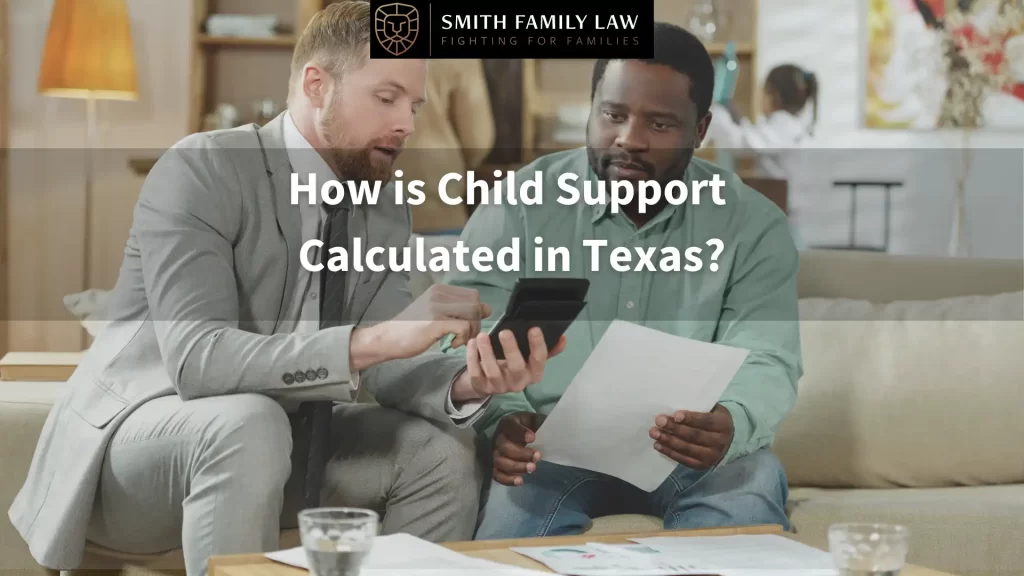When going through a divorce involving children under the age of 18 in Texas, one often wonders how is child support calculated in Texas. Such cases typically require child support payments of some kind. In most of these cases, conservatorship determines who will pay for the child’s ongoing needs and support. This means that whoever predominantly lives with and cares for the child is usually exempt from child support payments.
Generally speaking, a guideline as defined by Texas law identifies both custodial and non-custodial parents, meaning parents who physically possess the child (custodial) and the other who does not (non-custodial). Typically, in the event of a divorce, the court orders the non-custodial parent to pay child support. But this is not always the case, and some exceptions to the rule can apply.
A court order demanding a parent pay child support usually depends on the parent’s net income. Net income includes all sources of the parent’s gross income, such as interest and dividends, all salaries and wages, property investments, and self-employed income, minus certain costs such as the child’s healthcare payments, Social Security taxes or retirement plan contributions, union dues, and federal and state income taxes. To calculate child support in Texas and determine the amount you might pay, divide your net income by 12 to find your net monthly income. Then, multiply your net monthly income by one of the percentages below based on the number of children you will have to support. The different child percentages are:
- 20% for one child
- 25% for two children
- 30% for three children
- 35% for four children
- 40% for five or more children
Am I Exempt From Having to Pay Child Support?

The time and energy one parent spends caring for their child will have a major impact on the amount of child support the court will order them to pay. Additionally, if a parent is already paying for the child’s expenses, such as secondary education costs or medical debt, the court will factor this into its final decision. Texas law sets a guideline for child support payments, so nothing is concrete. This means your payments could increase or decrease depending on your specific financial status or the investments and sacrifices you make for your child.
Unemployed parents sometimes also have to make child support payments in certain cases. It will depend on the nature of the benefits they receive. Suppose a parent is ordered to pay child support but cannot. In that case, the court may repossess any non-profitable assets owned by the parent, such as a second house or real estate, and assign it a financial value instead of cash payments.
Choose the Right Representation – Choose the Smith & Bledsoe Family Law Firm
For clarity on how child support is calculated in Texas and for the sake of your child, it is recommended that you contact a skilled family law attorney as soon as possible in light of your divorce. They can help manage the ins and outs of family and divorce law so that you can spend more time with your loved ones.
The lawyers at Smith & Bledsoe Family Law Firm are firmly grounded in the basic legal areas of divorce law and family planning. Our dedicated team of focused family lawyers can help you get on the right track following a divorce. This includes helping your child, or children, as well.
We have successfully represented people from all walks of life, helping them achieve the just outcomes they deserve in the difficult case of divorce and family legal issues. Our knowledgeable partners train to help you assemble all relevant information about your marriage and family from public and private files. We bring a serious, unsparing approach to the legal issues of divorce and family division. Neither you nor your child deserves to suffer because your ex-spouse refuses child support payments.
Oftentimes, emotions around marriages ending in divorce and related family dilemmas run deep. You will want a strong attorney by your side to listen to and lead you through the touchy, ultimately life-changing fight for child custody you seek in your divorce. Smith & Bledsoe Family Law offers a free case evaluation with a respected attorney. You can call us today at (512) 277-3166 to see if our family and divorce law services might be right for you.
Related Posts:
